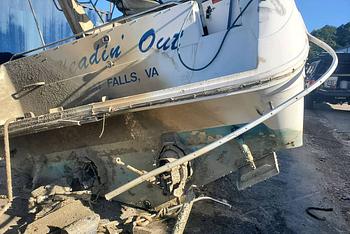There is no doubt about it that buying a boat is a major purchase, and rarely a process to be rushed. Talk to any boat owner, and they are likely to have a story to tell about what they got wrong on their first (or even second and third) purchases and how hindsight is a wonderful thing. We recommend learning from others and not going straight into a purchase without some serious thought about what you want out of your boat and which model can deliver on that at a price that’s right for you.
To help you get a step ahead, let’s take a walk through the most common mistakes made by first-time boat buyers—and how to avoid them.

1. Buying Too Big a Boat
Bigger is not always better, especially if you are a new boat owners without much experience on friends’ boats; buying a boat that’s beyond your experience level is a common mistake. Be realistic about your skills—and keep in mind the increased monthly and annual costs of a bigger boat. Then choose a boat you feel 100 percent confident in learning to handle. You will be taking friends and family out on your beloved new purchase, and if you don’t feel confident at the helm, it can be stressful. While this applies to both motorboats and sailing yachts, it is particularly relevant to the latter, as the skills involved in sailing may take more time to acquire. Start off with a boat that suits your needs but doesn’t overwhelm you.
2. Not Planning for Future Needs
Ok, so we’ve recommended not getting a boat that’s too big, but the same applies to a boat that you might outgrow quickly. We are referring mostly to motorboats here; you may find that spending a little more initially for an 18- or 20-foot boat will serve you better than settling for a cheaper 16-foot model. This happens more often than you might think. When you buy a new boat, suddenly your friends want to come along—and you want to take them. And if you have young children, in a few short years your family will have different needs. Yes, you can always trade up, but in the short term, will the boat you buy handle the activities you’ll want to use it for—fishing, watersports, weekend cruising, or blue water sailing around the world?
3. Not Budgeting Realistically
The initial purchase price of a boat is only the beginning of the ongoing costs of owning a boat, and it’s important that you budget carefully. Allow for annual expenses including marina and berthing fees, insurance, and a generous maintenance allowance. The enjoyment in a boat is quickly lost when funding it becomes a headache, and by scrimping and not keeping up with maintenance schedules your asset will quickly devalue. Check out our guide to budgeting for your boat to get a deeper understanding of what’s involved, as well as our Marine Insurance Guide before you make your purchase.
4. Not Doing Your Research
Buying a boat is one of the larger purchases many people make, so it’s imperative that you know what you’re getting. Take your time before committing to understand the design of different models, their pros and cons, the shipyard and their strengths. Talk to people who have owned different model and read the model reviews. Investigate the reputation of the dealers. When you’ve got a shortlist of boats you like, be sure to assess their resale values, especially if you’re purchasing a used boat. Websites such as Rightboat.com are a handy way to compare many examples of the same model of boat. Once you’ve chosen a strong contender, don’t rush into purchasing a used boat without thoroughly investigating its history and undertaking a professional survey.

5. Financing for Too Long
Financing a boat is a good way to buy a high-value asset and spread the cost over several years. It is tempting to look at the figures and low monthly marine loan repayments and spread them over a long period of time. Putting down a 10% deposit and then taking out a loan for an extended period of time is rarely a good idea because, unlike houses, boats depreciate in value. If the economy changes over time, luxury assets are harder to sell. You will be in a stronger position if you put down a larger deposit and choose higher monthly repayments over a shorter period of time. Read How to Finance a Boat
6. Not Considering the Right Style of Boat for You
Long before you start your search for a boat you need to sit down and carefully consider how you will use it. Do you want it for weekend cruising? If so, then it needs to have a cabin and galley. If it’s for day cruising, and entertaining family and friends on lakes or coastal waters, then choose a model with plenty of deck and seating space. Once you start your search, it’s easy to get swayed by attractive boats that don’t actually fit your needs, so going in armed with a clear list of what you need will help you to whittle it down to the perfect choice. That being said, be open to suggestions from brokers who are experienced in their field, but don’t lose sight of what it is you know you need.
7. Choosing the Wrong Surveyor
Despite brokers having a responsibility to disclose all information about a used boat, often they themselves don’t have all the information so it’s important to get your own pre-purchase survey done before committing to buying. A surveyor represents your interests, so it’s important that the one you choose be experienced with the type of vessel you are considering buying. Hiring a surveyor who is an expert in sailing yachts to inspect a canal boat won’t make any more sense than hiring the canal boat expert to survey your offshore cruiser. If your surveyor finds an issue of concern and recommends bringing in a specialist for a second opinion, take their advice. Spending a bit more up front can save you a lot of money in the long run. To learn more about surveys, read our post on Understanding Marine Surveys.
8. Buying a “Bargain” at a Boat Show
Boat shows are a great place to see the latest models of boats, to feel swept up in a shared excitement for boating and, yes, to get some bargains. But are boat shows the best place to buy a boat? Sometimes yes and sometimes no. “Show only” offers and a highly charged and competitive atmosphere between dealers may mean you can find a bargain on a brand-new boat that is exactly what you want, in which case, the boat show is the perfect place to buy! Just don’t forget all of the potential mistakes described above, and if you haven’t done your research yet, take a few breaths and slow down. Consider if a similar used boat might offer better value for money, or if you could get a better model for the same price. Refer to websites such as Rightboat.com, which offer thousands of used (and new) boats. Then perhaps sleep on it; you can always wake up the next day, return to the show, and buy the boat!
This article was published in April 2023 and updated in October 2024.




